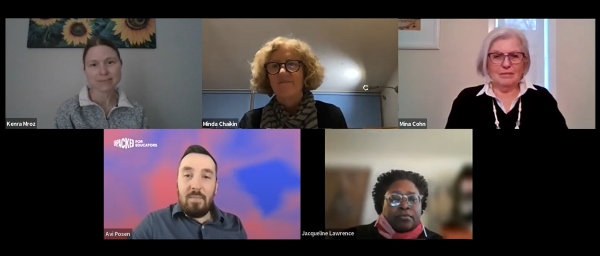By Minda Chaikin
Early on, CHES became aware of the disturbing rise in antisemitism connected to the May 2021 war between Israel and Gaza.
By the end of May, CHES was receiving communications from parents from various schools in the OCDSB about alarming bullying on social media, including violent antisemitic comments. Some students were being excluded by friends because they are Jewish and perceived to be murderers of Palestinian children.
It became clear that teachers in the OCDSB were struggling to address this situation, with most feeling unprepared. As some teachers said: “We don’t want to touch the Palestinian-Israeli issue with a ten-foot pole.” “The problem with antisemitism in education isn’t that no one is speaking up; it’s that schools aren’t listening,” said Ottawa student, Talia Freedhoff.
With teachers dismissing their concerns, too many Jewish students felt their safety did not matter, and that they were being left to fend for themselves.
CHES realized that there was an urgent need to address this situation and so searched for a program that would address the needs of the administration, teachers, the OCDSB’s Equity and Diversity staff, and the Jewish students.
Finding that no such existed program in Canada, CHES approached Avi Posen of Unpacked for Educators, a division of OpenDor Media (OpenDor Media – Media for the Jewish Future). A Canadian and former Winnipeg educator who lives in Israel, Avi is its Assistant Director of Education. His focus is on content creation for training educators around the world to lead difficult conversations on complicated subjects. CHES felt that the work of Unpacked for Education perfectly suited the challenge facing us.
Although we recognized that this was a very challenging task and could be perceived as impossible to tackle, Avi’s response was: “ I don’t think anything is impossible,” and we were on our way!
Our team included Minda Chaikin, chair of CHES’ educational committee; Kenra Mroz, CHES member, an educator in the OCDSB and her school’s co-chair of Equity and Diversity; a Grade 12 Jewish student who wishes to remain, anonymous), and Avi. With the support, input and encouragement of Mina, we embarked on creating ground-breaking webinars for the OCDSB.
From the beginning, we coordinated all our planning with Jaqueline Lawrence, OCDSB’s coordinator of Equity and Diversity, and OCDSB Superintendent Shannon Smith.
Led by Avi, Unpacking Complexity in the Classroom’s three webinars had the following goals:
- Preparing, equipping, and supporting educators with respect to handling difficult and sensitive topic areas with a focus on antisemitism.
- Encouraging and supporting educators with respect to having “courageous conversations” not only within their classrooms, but also with their colleagues.
- Providing strategies for ensuring a safe space for all students with respect to sensitive and challenging topic areas.
- Helping educators to become more confident and informed, overall, with respect to equity and diversity issues and helping to develop confidence with respect to these topic areas.
- Providing educators with the tools and resources necessary to accomplish the above goals for their students’ learning as well as their own learning.
Each webinars included a Q + A with Avi, Minda, and Kenra, all of which were presented anonymously. Educators were provided with an Exit Card Activity to help Avi assess what they took from each session. To view the first two webinars click here.
Webinar #1: Analyzing the Challenge was presented on March 18th and included testimonials from educators and students struggling with the current polarized political climate and tensions on social media. A discussion ensued about the rise of antisemitism in Canada and the ways in which current antisemitism manifests itself in the lives of Jewish students and in our schools. This was followed by a review of the International Holocaust Remembrance Alliance’s (IHRA) definition of antisemitism, and an examination of social media’s prevalence and its emotional impact on young people.
The webinar focused on preparing and equipping educators with the skills and tools needed to manage and facilitate difficult conversations surrounding controversial subject matter in the classroom. It stressed the importance of taking the time to prepare before introducing any difficult topic, alerting students who might be affected by the topic, and being open minded and curious. A brief introduction to Unpacked for Educators, including its pedagogical approach and philosophy, was also shared.
Webinar #2: A Deep Dive into the Issues was presented on April 13th. Additional testimonies were shared. Modern antisemitism was explained and the complexity surrounding the Israeli-Palestinian conflict was discussed as was the need to incorporate nuance, diversity of perspectives, humility, and empathy into teaching. Resources for best teaching strategies to incorporate the content of antisemitism were introduced.
Webinar #3: Learning Process and Progress was presented on June 8th and started with a brief review of current antisemitism. It was followed by a brief explanation of problematic symbols and chants that reflect current manifestations of antisemitism.

Much of this webinar was devoted to answering questions sent to us by OCDSB educators requesting advice or clarification. Questions focused on incidents and events that were perceived by these educators as difficult areas to navigate. Most were associated with the Palestinian /Israeli conflict. All the questions were anonymous, reflecting the fears of educators in the system regarding facing these issues and identifying themselves.
Unfortunately, this webinar was rudely interrupted by the Equity and Diversity coordinator as Avi was about to explain some of the symbols and chants that appeared at the Palestinian Youth Movement’s latest rallies and the harm these goings-on present to Jewish students and staff.
Stopping the recording of the webinar while the camera was rolling sent educators the message that chants and maps that effectively call for the removal of Jews from their ancestral homeland are not antisemitic. We worry that actions such as this will embolden those who hold this belief, causing further harm to Jewish students and staff.
Avi politely and professionally completed the webinar despite being so rudely interrupted, addressing all questions, and thanking the OCDSB for their courage in engaging in the important discussion of current antisemitism.
The feedback from OCDSB teachers and its administration concerning the webinars has been overwhelmingly positive. We are aware that this is a learning curve and only the beginning of a very long process. Avi, Minda, Kenra, and Mina continue to be available to any OCDSB teacher wrestling with how best to address difficult questions.
In an encouraging development, Jewish teachers in the OCDSB have formed their own employees’ group to deal with the threatening nature of the situation to their students and themselves. Lisa Levitan and Jennifer DiStefano initiated the formation of this group and are actively advocating on behalf of Jewish students and teachers within the OCDSB. Such a group is unprecedented; we commend them and hope our webinars provide some relief for the disturbing and sometimes frightening situations they confront on this ”frontline”.
CHES looks forward to a continuing collaboration with the OCDSB regarding antisemitism in its schools/ We recognize the complexity and the learning curve it represents for all involved and we strongly urge robust training on antisemitism at all levels of the OCDSB.






